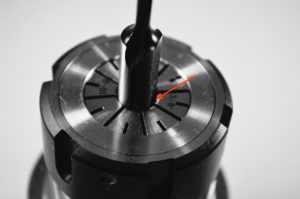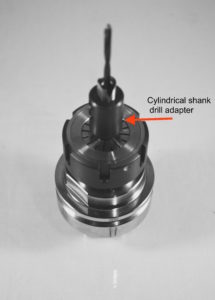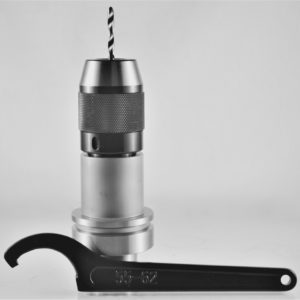Proper Use of Drill Bits on CNC Machining Centers
The proper use of drill bits on CNC applications is important. Using 10mm shank drill bits (with flat set screw land on the shank) in a standard collet/tool holder setup can lead to vibration. This causes poor finish, oval holes and chipping. When compared to spiral router bits, drill bits are run at a slower RPM (typically 6000-9000 rpm at 2 – 5.5/m/min) and while breakage might be tolerated if only drilling the occasional hole, it can become expensive for larger production runs. The reasons for this problem are two-fold:

1) You’re using a 10mm shank bit (w/flat on shank): Most metric drill bits have a 10mm shank with a flat area machined onto the shank (for set screw tightening). When inserted into a 10mm collet the flat spot prevents the collet from concentrically gripping the shank all around. (see red arrow in image above).
The solution: Our small 6381 drill adapter that goes between the collet and the drill bit fills this space and allows the collet to concentrically grip the shank. This adapter has a 10mm cylindrical shank (no flat) to go, which accepts the 10mm shank w/flat drill bit, tightened with a set screw as is standard on boring machines.

2) Using cylindrical shank bits (no flat on shank): Many in-between or uncommon sizes of cylindrical shank drill bits don’t fit snugly into the closest collet size available and therefore slip or chatter during the drilling process.
Another alternative solution: a Universal drill adapter (6380) which comes in two diameter ranges, infinitely adjustable within the specified range. (accepts 1-13mm diameter drills, or 3-16mm diameter) and is available in HSK63 F, ISO/SK30 and SK40 version. The 6380 Universal Drill Adapter has high-clamping power and accuracy and can be run either clockwise or counter-clockwise. For more information, please call us at 800-544-8436 or email sales@gdptooling.com

Recommended rpm and feed (progression) of drill bits:
| 3000 rpm | 1 – 2m/min |
| 4500 rpm | 1,5-2.5m/min |
| 6000 rpm | 2-3,5m/min |
| 9000 rpm | 2,5-5,5m/min |
